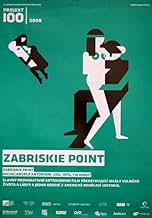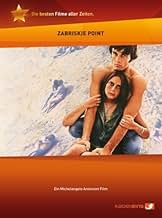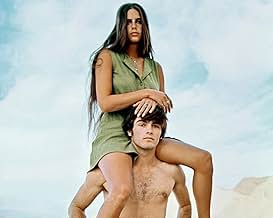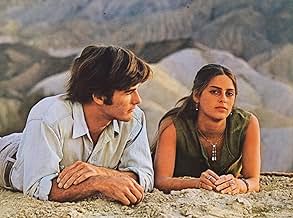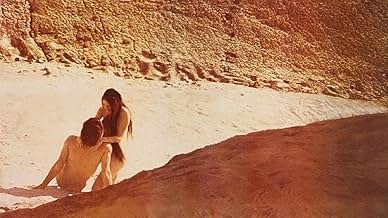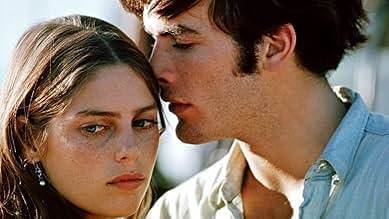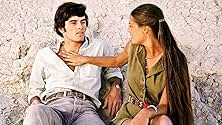At a time of chronic civil unrest in late 1960s America, a young revolutionary suspected of murder steals a plane and meets a girl.At a time of chronic civil unrest in late 1960s America, a young revolutionary suspected of murder steals a plane and meets a girl.At a time of chronic civil unrest in late 1960s America, a young revolutionary suspected of murder steals a plane and meets a girl.
- Awards
- 1 win & 1 nomination total
Martin Abrahams
- Radical student
- (uncredited)
Michael L. Davis
- Police lieutenant on loudspeaker
- (uncredited)
Lee Duncan
- Highway patrolman
- (uncredited)
George Dunn
- Airport mechanic
- (uncredited)
Dennis Falt
- University student
- (uncredited)
Harrison Ford
- Arrested student
- (uncredited)
Jim Goldrup
- College student
- (uncredited)
Norman Grabowski
- Man in Deli
- (uncredited)
Bill Hickman
- Gun store owner
- (uncredited)
- …
Kenner G. Kemp
- Departing Plane Passenger
- (uncredited)
Peter Lake
- Documentary cameraman
- (uncredited)
Featured reviews
These are the late 60's and the early 70's as I have always imagined. As usual Antonioni uses all the registers of communications: the sounds, the colours, the movements of the actors. You could say that the plot is not well balanced, that the dialogues are often silly and meaningless, and maybe you are right. But Antonioni is a master in evoking feelings, simple, rough feelings, using all the tools a filmmaker has.
The movie has some jewels, and among them the most shining are the 10 final minutes. The oneiric explosion sequence, with the music that comes and goes, with the time expanded and slowed down, with the kitsch colours of meaningless objects moving upward in the blue sky. In the movie history this is one of the best images of the explosive and destructive power of the ingenuity of that generation, that wanted to live changing the existing rules. Playing with colour, time, sounds and music Antonioni has given once more a proof of his unforgettable art: he is at the same time a painter, a music composer, a dancer, a poet.
The movie has some jewels, and among them the most shining are the 10 final minutes. The oneiric explosion sequence, with the music that comes and goes, with the time expanded and slowed down, with the kitsch colours of meaningless objects moving upward in the blue sky. In the movie history this is one of the best images of the explosive and destructive power of the ingenuity of that generation, that wanted to live changing the existing rules. Playing with colour, time, sounds and music Antonioni has given once more a proof of his unforgettable art: he is at the same time a painter, a music composer, a dancer, a poet.
About two hundred members of a Cleveland, Ohio USA film society, named Cinematheque, gathered on August 19, 2000 to view a pristine Cinemascope print of Michelangelo Antonioni's 1970 film, "Zabriskie Point." Cinematheque Director John Ewing, who does a superlative job of obtaining the finest prints for his series, shared with the audience beforehand that this print was specially flown over from Italy for this one showing only.
The audience was held spellbound as the film unfolded its artisty on the huge panoramic screen. Watching this superb print, shown the way Antonioni intended, made one aware that this is indeed a modern art work. It was all the more fitting that the series is housed in the Cleveland Insititue of Art in University Circle.
Antonioni's compositions are created for the Cinemascope landscape. His beautiful balancing of images, striking use of colors, sweeping choreographic movements, all are the work of a genuine artist, using the screen as his canvas.
At last the audience could understand "Zabriskie Point." As its narrative unfolded, it became obvious that this work is not about story per se, but rather an artist's impressionistic rendering of fleeting images of his subject. The setting of some of the more turbulent activities of the sixties provides only a dramatic motor for the artist's sweeping collage.
Antonioni is not bound by conventional narrative standards, and can pause at any point to creatively embroider an event with grandiose embellishments. The audience willingly went with the flow of his remarkable imagination, as his huge images on the massive canvas held one in rapt attention. While the audience may have been only tangentially involved in character relationships, it realized the theme here is human aleination, the director's recurring theme.
It was also realized that no print any smaller or of lesser quality than this original one in Cinemascope can do justice to this particular rendering. The audience was therefore all the more appreciative of viewing "Zabriskie Point" in its original, breathtaking format, and broke into thunderous applause at the end.
The audience was held spellbound as the film unfolded its artisty on the huge panoramic screen. Watching this superb print, shown the way Antonioni intended, made one aware that this is indeed a modern art work. It was all the more fitting that the series is housed in the Cleveland Insititue of Art in University Circle.
Antonioni's compositions are created for the Cinemascope landscape. His beautiful balancing of images, striking use of colors, sweeping choreographic movements, all are the work of a genuine artist, using the screen as his canvas.
At last the audience could understand "Zabriskie Point." As its narrative unfolded, it became obvious that this work is not about story per se, but rather an artist's impressionistic rendering of fleeting images of his subject. The setting of some of the more turbulent activities of the sixties provides only a dramatic motor for the artist's sweeping collage.
Antonioni is not bound by conventional narrative standards, and can pause at any point to creatively embroider an event with grandiose embellishments. The audience willingly went with the flow of his remarkable imagination, as his huge images on the massive canvas held one in rapt attention. While the audience may have been only tangentially involved in character relationships, it realized the theme here is human aleination, the director's recurring theme.
It was also realized that no print any smaller or of lesser quality than this original one in Cinemascope can do justice to this particular rendering. The audience was therefore all the more appreciative of viewing "Zabriskie Point" in its original, breathtaking format, and broke into thunderous applause at the end.
I was told it was one of those "either you love it or you hate it" movies. Well, I loved it. Obvious hippie-era, dated and easy symbolism and all. So, I probably have no taste at all when it comes to Antonioni, but this and La Notte (made exactly a decade earlier) are my favourites among his movies so far. Made two years before I was born, Zabriskie Point was supposed to have been Michelangelo's great American epic. But apparently, it turned out to be a flop. I really can't see why. Before watching it I'd read that it was rather boring, so I braced myself for a very slow movie - though I love me a slow movie. For my taste, Zabriskie didn't have a tedious minute in it. While watching it, I made a mental note of how European it was on the director's part to make such frequent use of advertisement billboards in almost every urban scene, enormous billboards dwarfing any human form in sight. This recurrent visual element is obviously there to underline the way that consumerism crushes the individual in American society. But then I watched L'Eclisse straight afterwards, which is set in Rome in the early 60s, and noticed that Antonioni often included billboards in it as well. After all, the masterful use of landscapes, architecture and inanimate objects in each frame with or without human beings is an Antonioni trademark this is precisely the way that he evokes his characters' psychological states, with more or less understated power and great visual impact. He is virtually unsurpassed in this skill.
Zabriskie Point starred two very appealing leads that should have become big stars of the 70s, but never did. Mark Frechette, whom I'd already seen in Francesco Rosi's fine WWI-set movie Uomini Contro, had a very tragic life and died aged just 27. According to his biography page, he donated his $60,000 earnings from Zabriskie to a commune. Mark's co-star Daria Halprin, apparently also Dennis Hopper's wife later on, has the stunning, natural beauty and appeal of a young Ornella Muti one of those luminous beauties that don't need a shred of make-up to turn heads. Like Frechette, she has only graced a couple of obscure movies and has never become a star, but at least she didn't die tragically. Most notably, Zabriskie Point contains one of the most original sex scenes ever filmed - one that brings home a sense of youthful playfulness like few I've seen - as well as a powerfully cathartic ending. It may be the most banal sequence ever filmed as far as its symbolism goes, but I can't see how anyone can deny its beauty and wonderful sense of emotional release. Never has an explosion looked so good, and so poetic. It seems to be an explosion that restores order rather than bringing chaos.
Zabriskie Point starred two very appealing leads that should have become big stars of the 70s, but never did. Mark Frechette, whom I'd already seen in Francesco Rosi's fine WWI-set movie Uomini Contro, had a very tragic life and died aged just 27. According to his biography page, he donated his $60,000 earnings from Zabriskie to a commune. Mark's co-star Daria Halprin, apparently also Dennis Hopper's wife later on, has the stunning, natural beauty and appeal of a young Ornella Muti one of those luminous beauties that don't need a shred of make-up to turn heads. Like Frechette, she has only graced a couple of obscure movies and has never become a star, but at least she didn't die tragically. Most notably, Zabriskie Point contains one of the most original sex scenes ever filmed - one that brings home a sense of youthful playfulness like few I've seen - as well as a powerfully cathartic ending. It may be the most banal sequence ever filmed as far as its symbolism goes, but I can't see how anyone can deny its beauty and wonderful sense of emotional release. Never has an explosion looked so good, and so poetic. It seems to be an explosion that restores order rather than bringing chaos.
This is the film in Antonioni's middle period that most critics dismiss quickly, as a 'flawed' look at 60s American youth culture/politics. For what it's worth, I found it more touching and memorable than his more acclaimed films like L'AVVENTURA, perhaps because he shows more emotion & empathy here than anywhere else. The story is simple, but it is used as a frame for Antonioni's brilliant observations of, and critique on American consumerist culture, student life, the counter-culture, and the whole anti-establishment, anti-war backlash that was so prominent then.
Even from a purely technical point of view, it is a remarkably crafted film; from the opening credits sequence to the bizarre desert 'love-in', to the use of billboards, and right down to that jaw-dropping, cathartic finale that used 17 camera set-ups (in it's own way, as powerful as the climax of The Wild Bunch). Also, Antonioni chose one hell of a leading lady with Daria Halperin, one of the most beautiful ever to grace the screen. There isn't much 'acting' involved, as this feels more like a docu-drama, and so the use of non- professionals as the lead couple works quite effectively within that context. And the soundtrack is not only filled with marvelous music, its use is impressive as well (I can't forget the start of the film, mostly due to the selection of music - by Pink Floyd - that grooms the visuals so well).
Contrary to popular opinion, this is quite an achievement in cinema, and one I would enthusiastically recommend to anyone with a taste or tolerance for the off- beat. Well worth seeking out, and one of those key films of the 60s that demands a DVD restoration/release.
Even from a purely technical point of view, it is a remarkably crafted film; from the opening credits sequence to the bizarre desert 'love-in', to the use of billboards, and right down to that jaw-dropping, cathartic finale that used 17 camera set-ups (in it's own way, as powerful as the climax of The Wild Bunch). Also, Antonioni chose one hell of a leading lady with Daria Halperin, one of the most beautiful ever to grace the screen. There isn't much 'acting' involved, as this feels more like a docu-drama, and so the use of non- professionals as the lead couple works quite effectively within that context. And the soundtrack is not only filled with marvelous music, its use is impressive as well (I can't forget the start of the film, mostly due to the selection of music - by Pink Floyd - that grooms the visuals so well).
Contrary to popular opinion, this is quite an achievement in cinema, and one I would enthusiastically recommend to anyone with a taste or tolerance for the off- beat. Well worth seeking out, and one of those key films of the 60s that demands a DVD restoration/release.
There aren't too many times when I see a film and go, "huh, what?", but this was one of them. Maybe after seeing Zabriskie Point I felt much the same way Woody Allen felt after seeing 2001- he only liked the film after seeing it three times over a two year period, realizing the filmmaker was ahead of him in what was going on. Michelangelo Antonioni, in one of his few tries at making films inside of the US (after Red Desert, he did Blow-Up, this film, China, and The Passenger, all filmed outside his native Italy), I could sense he almost tried to learn about the ways of the country through his own mastery of the medium. The results show that he doesn't lack the means to present images, feelings, tones, colors, sounds, and a visual representation of this era. "A director's job is to see", Antonioni once stated. Whatever that means, he doesn't disappoint for the admirer of his post-fifties work (I say post-fifties since I've yet to see any of his films from before L'Avventura).
What he does lack is a point, at least the kind of point that he could bring in Blow-Up and The Eclipse. You get the feeling of what is around these characters, what the themes are bringing forth to their consciousness, however in this case the characters and the actors don't bring much conviction or purpose. Antonioni, coming from the school of hard-knocks, neo-realistic film-making, does do what he can with his mostly non-professional cast (those who look most like real actors are subjugated to the roles of the corporate characters), but the two stars Mark Frechette and Daria Halprin seem as if Antonioni's under-directing them. Perhaps that was the point. The story's split into three acts, thankfully not too confusing, as Mark escapes his existence around the boiling, dangerous campus life going on in the circa late 60's LA area, and Daria is sent out from LA to drive to Phoenix for some business meeting. They meet by chance as Mark's plane (how does he know how to drive, maybe a little background info there?) and Daria's car meet up, and they spend some time together in an existential kind of groove out in the desert. Aside from a stylistically mesmerizing if bizarre sex scene, much of this act isn't terribly interesting.
The two leads are fair enough to look at, but what exactly draws them to each other outside of curiosity? The ideas that come forth (in part from a screenplay co-written by Sam Shepard) aren't too revealing, except for one brief instant where drugs vs. reality is brought up. Then the film heads towards the third act, as Mark decides to do the right thing, under disastrous circumstances, and Daria arrives at her boss' place, only to be in full disillusionment (not taking into account the infamous last five minutes or so of the film). Although the film took its time telling its story, I didn't have as much of a problem with that as I did that the story only engages a certain kind of viewer. I understand and empathize with the feelings and doubts and fears as well as the self-confidence of the "anti-establishment", but maybe Antonioni isn't entirely fully aware of it himself. In some scenes he as director and editor (and the often astounding cinematography by Alfio Contini) find the scenery and backgrounds more enlightening and fixating than the people in the foreground. Not to say the technical side of Zabriskie Point isn't involving to a degree (this may make some feel drowsy, as Antonioni is probably far greater as a documentary filmmaker as he is a theatrical director like say Francis Ford Coppola is).
The deserts, skies, city, and even the faces in close-ups are filmed with the eye of a filmmaker in love with the art of getting things in the frame, bringing us in. The soundtrack is equally compelling, with a master stroke including a sweet Rolling Stones song at one point, and then a crushing, surreal Pink Floyd song (re-titled from 'Careful with that Axe Eugene, one of their best pre-Dark Side) in the explosion sequence. If only the performances weren't so one-sided I might find this to be on par with Blow-Up or The Eclipse. It's an unconventional stroke of genius on one hand, and on the other a boring take on what was the hippie/radical movement of the late 60's. But hey, what may be boring for an American such as myself born in the eighties may not be to others outside the US, such as say, Italy. And it does ask to not be discarded right away after one viewing.
What he does lack is a point, at least the kind of point that he could bring in Blow-Up and The Eclipse. You get the feeling of what is around these characters, what the themes are bringing forth to their consciousness, however in this case the characters and the actors don't bring much conviction or purpose. Antonioni, coming from the school of hard-knocks, neo-realistic film-making, does do what he can with his mostly non-professional cast (those who look most like real actors are subjugated to the roles of the corporate characters), but the two stars Mark Frechette and Daria Halprin seem as if Antonioni's under-directing them. Perhaps that was the point. The story's split into three acts, thankfully not too confusing, as Mark escapes his existence around the boiling, dangerous campus life going on in the circa late 60's LA area, and Daria is sent out from LA to drive to Phoenix for some business meeting. They meet by chance as Mark's plane (how does he know how to drive, maybe a little background info there?) and Daria's car meet up, and they spend some time together in an existential kind of groove out in the desert. Aside from a stylistically mesmerizing if bizarre sex scene, much of this act isn't terribly interesting.
The two leads are fair enough to look at, but what exactly draws them to each other outside of curiosity? The ideas that come forth (in part from a screenplay co-written by Sam Shepard) aren't too revealing, except for one brief instant where drugs vs. reality is brought up. Then the film heads towards the third act, as Mark decides to do the right thing, under disastrous circumstances, and Daria arrives at her boss' place, only to be in full disillusionment (not taking into account the infamous last five minutes or so of the film). Although the film took its time telling its story, I didn't have as much of a problem with that as I did that the story only engages a certain kind of viewer. I understand and empathize with the feelings and doubts and fears as well as the self-confidence of the "anti-establishment", but maybe Antonioni isn't entirely fully aware of it himself. In some scenes he as director and editor (and the often astounding cinematography by Alfio Contini) find the scenery and backgrounds more enlightening and fixating than the people in the foreground. Not to say the technical side of Zabriskie Point isn't involving to a degree (this may make some feel drowsy, as Antonioni is probably far greater as a documentary filmmaker as he is a theatrical director like say Francis Ford Coppola is).
The deserts, skies, city, and even the faces in close-ups are filmed with the eye of a filmmaker in love with the art of getting things in the frame, bringing us in. The soundtrack is equally compelling, with a master stroke including a sweet Rolling Stones song at one point, and then a crushing, surreal Pink Floyd song (re-titled from 'Careful with that Axe Eugene, one of their best pre-Dark Side) in the explosion sequence. If only the performances weren't so one-sided I might find this to be on par with Blow-Up or The Eclipse. It's an unconventional stroke of genius on one hand, and on the other a boring take on what was the hippie/radical movement of the late 60's. But hey, what may be boring for an American such as myself born in the eighties may not be to others outside the US, such as say, Italy. And it does ask to not be discarded right away after one viewing.
Did you know
- TriviaAntonioni met with Jim Morrison during early production to ask for a musical contribution to the soundtrack. Morrison and the Doors provided "L'America" which Antonioni then rejected.
- GoofsZabriskie Point, in Death Valley National Park (California, USA) is not actually the lowest-elevation point in the United States. That would be Badwater Basin, at a depth of 282 feet below sea level, which is also located in Death Valley National Park about 20 miles away.
- Quotes
[booking a protester]
Cop: Occupation?
William S. Polit, protester: Associate professor of history.
Cop: That's too long, Bill. I'll just put down clerk.
- Alternate versionsIn the original version, the song that's playing when Daria drives away at the very end and over the closing "End" title card is a Roy Orbison song, but in the 1984 MGM/UA Home Video version it's a continuation of the Pink Floyd song. The 1991 MGM/UA Home Video version restores the Orbison song.
- ConnectionsEdited into Histoire(s) du cinéma: La monnaie de l'absolu (1999)
- How long is Zabriskie Point?Powered by Alexa
Details
Box office
- Budget
- $7,000,000 (estimated)
- Gross worldwide
- $84,879
- Runtime1 hour 53 minutes
- Sound mix
- Aspect ratio
- 2.35 : 1
Contribute to this page
Suggest an edit or add missing content



